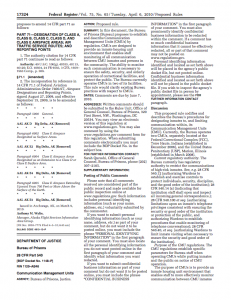 Secretive political prisons for “domestic terrorists†called Communications Management Units have been operating for more than three years on U.S. soil. Last week the federal Bureau of Prisons quietly submitted a proposal to make the experimental units permanent: a process that, by law, should have occurred before they were ever opened.
Secretive political prisons for “domestic terrorists†called Communications Management Units have been operating for more than three years on U.S. soil. Last week the federal Bureau of Prisons quietly submitted a proposal to make the experimental units permanent: a process that, by law, should have occurred before they were ever opened.
As a quick introduction, there are two Communications Management Units, or CMUs, in the country. They radically restrict prisoner communications with the outside world to levels that rival, or exceed, the most restrictive facilities in the country, including the “Supermax,†ADX-Florence. [For more information on CMUs and who is housed there: “Secretive U.S. Prison Units Used to House Muslim, Animal Rights and Environmental Activists.”]
On April 6, the Bureau of Prisons submitted a proposed rule (Docket No. 1148-P), listed in the federal register. Under the Administrative Procedures Act, there is now a required public comment period for responses to this proposal.
The public notice comes after the Center for Constitutional Rights and the American Civil Liberties Union each filed lawsuits challenging the constitutionality of the secretive facilities, where political prisoners have been transferred without notification, without explanation, and without opportunity for appeal. [See “5 Things You Should Know About America’s ‘Little Guantanamo.'”]
FOLLOWING THE LAW IN HINDSIGHT
The submitted proposal is clearly a response to these lawsuits, and an acknowledgment that the Communications Management Units were opened secretly and illegally. Now government officials are trying to cover their tracks and follow the legal process in hindsight.
It is a positive development that the government is recognizing, and being forced to defend, prison facilities kept hidden from the public. There is the possibility of placing true checks and balances on the government’s power to create experimental units that are unparalleled in the federal prison system.
However, this step in the right direction is negated by the Bureau of Prisons’ proposal to actually make these secretive prisons even more inhumane.
INCREASING RESTRICTIONS
 Daniel McGowan is housed at a Communications Management Unit
Daniel McGowan is housed at a Communications Management Unit
The lawsuit by the Center for Constitutional Rights argues that the facilities are unconstitutional for a variety of reasons, including the fact that they are cruel and inhumane. The extreme restrictions on inmate communications, including not allowing them to hug family members at the few visits they are allowed, go against a body of research and official government policy on prisoner treatment. Generally, the government encourages contact visits by family because they improve prisoner behavior, increase morale, and further rehabilitation.
“I haven’t been able to hug my husband, or even hold his hand, for two years,†said Jenny Synan, the spouse of a CMU prisoner and a plaintiff in the lawsuit. “This proposed rule does not explain how prohibiting a husband from holding his wife’s hand or keeping a father from hugging his daughter, is necessary for prison security.â€
The new proposal includes even more restrictions, including:
- “Written correspondence may be limited to three pieces of paper, double-sided, once per week to and from a single recipient;
- Telephone communication may be limited to a single completed call per calendar month for up to 15 minutes;
- and Visiting may be limited to one hour each calendar month.
MORE POWER, LESS OVERSIGHT
It should be noted that all federal prisoners have their communications monitored. And there are already policies in place for dangerous inmates who need additional monitoring.
The most prevalent of those policies are called Special Administrative Measures, or SAMs. SAMs are authorized by the attorney general based on information from the FBI and U.S. Attorney’s office.
This new proposal lowers the threshold for such special restrictions. According to the proposal, it allows for prison officials to act on “evidence which does not rise to the same degree of potential risk [emphasis added] to national security or risk of acts of violence or terrorism which would warrant the Attorney General’s intervention by issuance of a SAM.â€
The government is arguing two competing claims simultaneously: (1) That Communications Management Units are needed because the inmates are heightened security risks, and (2) That traditional oversight is too cumbersome because these inmates are not dangerous enough.
The aim is, admittedly, to place more unchecked power in the hands of lower-ranking government officials.
POLITICAL PRISONS
If, according the Bureau of Prisons, these inmates “do not rise to the same degree of potential risk to national security,†who is housed here?
As I have discussed here before, inmates and guards at the CMUs call them “Little Guantanamo.†They have also been described as prisons for “second-tier†terrorists.
The proposal confirms this, saying: “One important category of inmates which might be designated to a CMU is inmates whose current offense(s) of conviction, or offense conduct, included association, communication, or involvement, related to international or domestic terrorism.â€
It references past behavior as grounds for inmates being transferred there, but as I have reported, and as the recent lawsuits make clear, many of these inmates have no disciplinary history and no communications violations. Furthermore, these individuals were not the 9/11 hijackers or what most people think of as terrorists. They are prisoners like Daniel McGowan, who destroyed property as part of the Earth Liberation Front in the name of defending the environment.
The Bureau’s proposal makes clear that the CMUs are intended to keep these cases isolated, and to keep political prisoners with “inspirational significance†from communicating with the communities and social movements of which they are part.
These secretive prisons are for political cases the government would rather have out of the public spotlight.